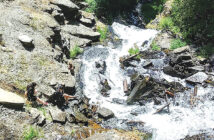Confederate events and philosophies are covered in several areas of the paper this week. Some columns, letters and articles revolve around agreement or disagreement about how history should be remembered today.
Sunday was a great day for a car ride in the country so my daughter Marly, her husband and toddler, Linda and I rode Route 6 in Goochland with a particular destination. We traveled to the nice little town of Goochland to see a historic house on the river.
The house, which is listed on the National Register of Historic Places, is for sale and Marly, Brandon and O’siris are looking for a new house, possibly in the country.
Called the Lock Keeper’s House, built in 1835 itwas the home of the lock keeper, the man who collected the toll near the upper end of the Kanawha Canal, which ends in Richmond. According to the National Park Service, the Kanawha was an “ambitious project that George Washington proposed as a young man surveying the mountains of western Virginia, the Canal succeeded in linking the Piedmont and Tidewater regions. It was a driver of economic growth for Virginia, but was ultimately overtaken by the railroads, floods, costs, and the Civil War.”
The Civil War, the Confederate flag and its resulting fallout recently has definitely been a media smorgasbord since Dylann Roof killed nine people at a black church in Charleston, S.C. Still reeling from that horrific event, the issues of ancestry and hatred that evolved from the war has many people thinking about what it means.
Chesterfield celebrated the 150th anniversary of the Civil War last year and actions at Bermuda Hundred. Chesterfield has also deemed April as Confederate History Month.
Chesterfield is certainly steeped in the history of two wars, the Revolutionary and Civil wars, as well as American Indian actions through the 1800s.
I wonder if it would help all of us to understand both sides the Civil War, borne of hatred or remembrance of ancestry, if we had a public discussion of this life taking time in our sorted history?


